Mapping of the corn genome opens up a new world of possibilities for producing more food, feed and fuel from maize.
The announcement was made last week that scientists at Washington University in St. Louis have completed the first ever mapping of the corn genome, only the second crop after rice to have its genome sequenced. The genetic data is available on-line at maizesequence.org.
The accomplishment, which was announced at the 50th Annual Maize Genetics Conference, is the result of a $30 million project initiated in 2005 and funded by the National Science Foundation, the U.S. Department of Agriculture and the U.S. Department of Energy.
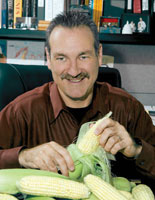 Richard K. Wilson, Ph.D., director of Washington University’s Genome Sequencing Center, says this is the first comprehensive glimpse at the blueprint for the corn plant. “Scientists now will be able to accurately and efficiently probe the corn genome to find ways to improve breeding and subsequently increase crop yields and resistance to drought and disease,” he said.
Richard K. Wilson, Ph.D., director of Washington University’s Genome Sequencing Center, says this is the first comprehensive glimpse at the blueprint for the corn plant. “Scientists now will be able to accurately and efficiently probe the corn genome to find ways to improve breeding and subsequently increase crop yields and resistance to drought and disease,” he said.
According to plant biologist Ralph S. Quatrano, Ph.D., chair of Washington University’s Department of Biology, “The genome will help unravel the basic biology of corn. That information can be used to look for genes that make corn more nutritious or more efficient for ethanol production, for example.”
 According to the National Corn Growers Association, valuable data provided by Ceres, Inc., Monsanto Company and DuPont business Pioneer Hi-Bred over the last several years was made available to researchers through NCGA’s MaizeSeq program.
According to the National Corn Growers Association, valuable data provided by Ceres, Inc., Monsanto Company and DuPont business Pioneer Hi-Bred over the last several years was made available to researchers through NCGA’s MaizeSeq program.
“The completion of a maize draft sequence is the first step in determining the function of all the genes in corn, which in turn, will allow corn growers to plant corn hybrids that are better able to withstand drought and other stresses and are better suited to market and environmental needs,” said NCGA President Ron Litterer. “Consumers will benefit from a more nutritious, abundant and sustainable food supply.”
 Legendary British carmaker Bentley says it is it will look to ethanol, lighter construction and more efficient gasoline engines… instead of diesel and hybrid motors… to meet the green demands of the future:
Legendary British carmaker Bentley says it is it will look to ethanol, lighter construction and more efficient gasoline engines… instead of diesel and hybrid motors… to meet the green demands of the future:

 A group is trying to combine their faith with its desire to live a life that will allow everyone to enjoy the Earth before they have to head off to Heaven.
A group is trying to combine their faith with its desire to live a life that will allow everyone to enjoy the Earth before they have to head off to Heaven. A French carmaker is introducing a truly unique vehicle to the North American market… one that runs on air!
A French carmaker is introducing a truly unique vehicle to the North American market… one that runs on air! Developed by Formula One race car engineer Guy Negre, the Air Car is equipped with a revolutionary dual-energy compressed air engine, achieving a fuel efficiency of 106 miles to the gallon. At low speeds, this vehicle emits only air from its tailpipe making it a good option for ‘green’ inter-city traveling. The Air Car is built with Compressed Air Technology (C.a.t.) and is designed to be relatively affordable, as it is estimated to cost approximately $18,000 and to consume only small quantities of fuel.
Developed by Formula One race car engineer Guy Negre, the Air Car is equipped with a revolutionary dual-energy compressed air engine, achieving a fuel efficiency of 106 miles to the gallon. At low speeds, this vehicle emits only air from its tailpipe making it a good option for ‘green’ inter-city traveling. The Air Car is built with Compressed Air Technology (C.a.t.) and is designed to be relatively affordable, as it is estimated to cost approximately $18,000 and to consume only small quantities of fuel.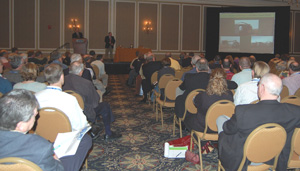 One of the most well attended learning sessions at the
One of the most well attended learning sessions at the 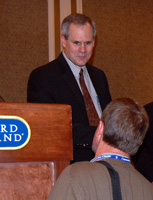 According to their calculations, Hickman says the United States could produce a 15.6 billion bushel corn crop seven years from now. “If we grow as much corn as we did in 2007 and the yield increases go from where they have in the last ten years, that would be possible in 2015,” he said. “That could then produce 19 billion gallons of ethanol and still provide exports and other uses for corn.”
According to their calculations, Hickman says the United States could produce a 15.6 billion bushel corn crop seven years from now. “If we grow as much corn as we did in 2007 and the yield increases go from where they have in the last ten years, that would be possible in 2015,” he said. “That could then produce 19 billion gallons of ethanol and still provide exports and other uses for corn.” Richard K. Wilson, Ph.D., director of Washington University’s Genome Sequencing Center, says this is the first comprehensive glimpse at the blueprint for the corn plant. “Scientists now will be able to accurately and efficiently probe the corn genome to find ways to improve breeding and subsequently increase crop yields and resistance to drought and disease,” he said.
Richard K. Wilson, Ph.D., director of Washington University’s Genome Sequencing Center, says this is the first comprehensive glimpse at the blueprint for the corn plant. “Scientists now will be able to accurately and efficiently probe the corn genome to find ways to improve breeding and subsequently increase crop yields and resistance to drought and disease,” he said.  According to
According to 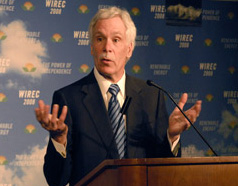 The federal government will invest a total of $18.4 million over three years for 21 new biomass research and development and demonstration projects.
The federal government will invest a total of $18.4 million over three years for 21 new biomass research and development and demonstration projects. 
 The Sioux Falls location is the newest Enterprise branch to receive the E85/FlexFuel designation as part of a nationwide effort to promote the expanded availability and use of E85, a blend of 85 percent ethanol and 15 percent gasoline. Enterprise will commit to fueling its Sioux Falls FlexFuel vehicles with VeraSun’s branded E85, VE85™.
The Sioux Falls location is the newest Enterprise branch to receive the E85/FlexFuel designation as part of a nationwide effort to promote the expanded availability and use of E85, a blend of 85 percent ethanol and 15 percent gasoline. Enterprise will commit to fueling its Sioux Falls FlexFuel vehicles with VeraSun’s branded E85, VE85™. The
The  Nuernberg says when she decided to make a career move she was looking for an exciting new industry with lots of potential.
Nuernberg says when she decided to make a career move she was looking for an exciting new industry with lots of potential.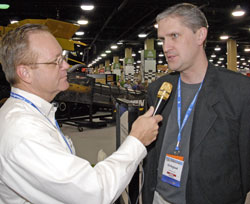 Ed Hegland is a farmer from Minnesota and currently serving as Chairman of the
Ed Hegland is a farmer from Minnesota and currently serving as Chairman of the 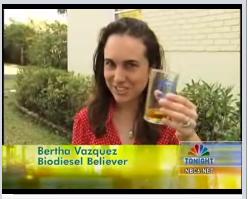
 I couldn’t resist this story when I ran across it.
I couldn’t resist this story when I ran across it.